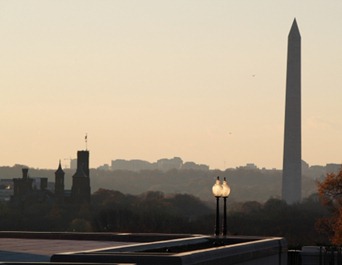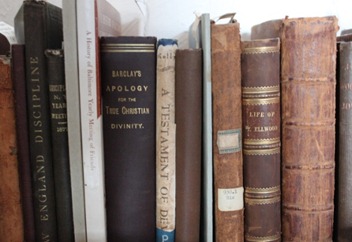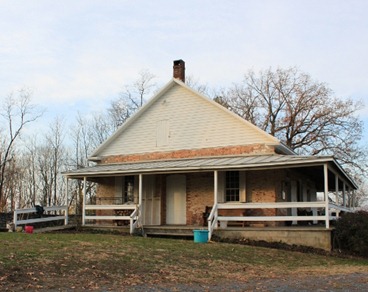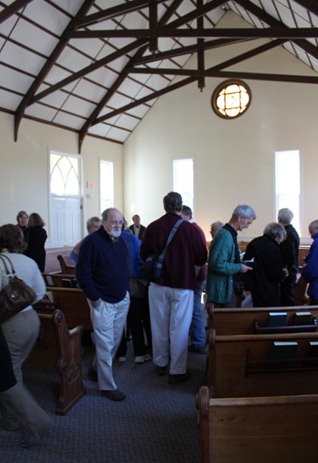This Wednesday at Capitol Hill Friends, we examined the third chapter of Paul’s first letter to the Church in Corinth. In this letter, Paul writes to a local Meeting that has become divided based on allegiance to human leadership. The Meeting is splitting into factions, with some preferring Apollos and other claiming Paul as their leader. Paul writes to tell them that they are missing the point. He explains that he and Apollos are only servants of the great Master, Jesus Christ, and that all devotion should ultimately be directed to him, and not to any earthly leader.
Master, Jesus Christ, and that all devotion should ultimately be directed to him, and not to any earthly leader.
Paul goes on to use a variety of metaphors to put in perspective the work that he and Apollos have been doing in Corinth. As servants of God, he explains, he and Apollos have acted as gardeners, each with his own particular task – one plants and another waters. Crucially, however, Paul points out that it is ultimately God who gives life and growth.
Another image that Paul uses to describe his and Apollos’ relationship to the Church is that of being construction workers. He writes about the ways in which he and other workers can build upon God’s foundation. Construction workers can do better or poorer jobs, depending on their skills and faithfulness. Nevertheless, Paul insists that there is only one Foundation upon which anything enduring can be built: “For no one can lay any foundation other than the one already laid, which is Jesus Christ.”(1)
Needless to say, a lot has changed since Paul’s first-century context. Thousands of years of accumulated tradition have transformed the Church from a small, radical, adaptive body of believers scattered throughout the Roman Empire into a worldwide family of faith, encompassing thousands of independent sub-traditions. Even in the first century, Paul already saw the ways that human leaders and traditions could obscure the gospel foundation. Today, we have twenty centuries of “construction work” to sift through as we seek to be faithful to Christ in our midst.
through as we seek to be faithful to Christ in our midst.
For Quakers, George Fox was the most important builder since Paul. Fox’s legacy is immense: his writings, apostolic ministry and role in the development of Friends polity have had an enduring impact on the way Quakers have understood and organized themselves for the last three hundred and fifty years. Furthermore, George Fox represents far more than his own personal ministry. Fox blessed the systematic theology of Robert Barclay, the evangelical fervor of the Valiant Sixty, and William Penn’s “Holy Experiment” in America. George Fox represents the rich heritage that Friends share as a unique stream in the Christian tradition.
George Fox, and all he stands for, means so much to Friends today. He and his fellow apostles were faithful servants of Christ in their own time and place, and they left us with a rich tradition that has helped many individuals and communities come into deeper relationship with Christ Jesus. Nevertheless, the fact remains that George Fox and the Valiant Sixty are dead. Their time and service has come to an end.
George Fox and the Valiant Sixty are dead. Their time and service has come to an end.
If we are to honor the faith of George Fox and the early Friends, we must continue to listen to the ways in which Christ is leading us today. Parroting old Quaker clichés and sitting together in lifeless silence will not cut it. Faithful Christian life and witness will look different today than it did in 17th-century England – or 20th-century America, for that matter. If we are to be true to the faith of the early Friends, we may be required to “betray” them in order to follow Jesus.(2) Just as Jesus guided our spiritual ancestors, he continues to teach us today. In the end, he must be the foundation of everything that we do.
Like the early Friends, we must be willing to let go of anything that gets in the way of us following Jesus as a community in our present context. All of our human traditions – our ways of speaking, songs, church structures, dress and business process – must be submitted to Christ so that he can lead us in his eternal, yet always new Way.
context. All of our human traditions – our ways of speaking, songs, church structures, dress and business process – must be submitted to Christ so that he can lead us in his eternal, yet always new Way.
What are the ways in which we are being called to lay down the human traditions that served our ancestors well but are no longer relevant to our present context? What are the ways that old structures and habits get in the way of us living out the love, life and power of Jesus Christ in our communities? How can we tell the difference between a dead form and a useful tradition that God is calling us to maintain and use faithfully in our generation? How can we be faithful to Christ’s ongoing guidance, fulfilling the law through obedience to the living Spirit of God?
–
1. 1 Corinthians 3:11
2. An excellent piece that develops this idea is “A Faithful Betrayal?” by Wess Daniels in the Jan/Feb 2010 edition of Quaker Life
Extremely well written and thoughtful piece. I always found it interesting in my years amongst Friends that everyone, regardless of their theological POV, quoted George Fox for “proof-texting.” You correctly point out that George himself would have pointed to a different source…
Thanks for these thoughts. My thought about tradition is that it is the way the past participates in current discussion. If Christ is active now — Christ was also active then — so we must listen.
Conversely, we must decide as best we can. The past might resist necessary change, but it will always stand aside when the time comes to move forward.
In my recent reading of the early Friends, George Fox included, but others as well, I have found soul mates. I find the gospel as preached by early Friends to be a very ‘whole-istic’ gospel. My problem is folks who proof text from George who can only see what he says that sounds liberal, or those other folks who proof text from George who can only see what he says that sounds ‘orthodox.”
To ask ourselves what it means to be Quaker is good. If we are just going to be like the Methodist, Baptist, or Universalist church down the street, what is the point of our existence?
I’m not trying to start an argument here, I’m just sharing some thoughts that have been roaming around through my head. I read your writings with interest and reflection, keep up the good work.
I must respectively disagree with your term ‘lifeless silence.’ Can silence not be a way to connect with the Gospel and it’s teachings? More importantly, would the meditative silence of other religions also be called ‘lifeless?’ I would appreciate it if you could be a little clearer on what you mean.
That article so interesting.
I called attention to how the approach is based on the Biblical passage 1 Corinthians 3:1-23.
The fact is that sometimes we put our eyes on the men, leaving aside the spiritual truths and example of Jesus Christ.
Not that these men, in their time as well as many in our time have done amazing things in the works of God.
But we must not forget that they only have been tools used by God, as we can be.
Often, it is easier to listen and follow men who strive to have an intimate relationship with God, to seek our own intimate relationship with God (which requires time, effort and desire on our part to point to changes in our life in those areas that hold us back our spiritual goal.)
We must find a level of spiritual maturity that allows us to understand our role and the path we must follow and do not doubt that God will use as many men have used throughout history.
We can not live our spiritual life through what others have experienced. These should be only examples of life that encourages us to seek a deep and intimate relationship with God.
The life of George Fox as well as the lives of many other men of history clearly shows us how God can use man to do great things.
Raul Perez.
El Salvador Yearly Meeting
@CJ Glad you liked the piece! What is your experience among Friends? I’ve subscribed to your blogs, but I haven’t found reference to Quakers in them.
@Michael I agree with you. It’s definitely a balancing act between hearing the voice of the Spirit now and respecting how Christ has spoken to prior generations. Tradition can be life-giving when it is received in the right spirit.
@Dale I am fairly fond of tradition myself, and belong to probably the most traditionalist Yearly Meeting in the world. I have been very blessed by the wealth of the Quaker tradition, and feel generally respectful of the wisdom of past Friends and of the early Church.
This essay simply represents my own wrestling with the ways in which tradition is capable of becoming a leaden weight, as we see it was for the Jewish authorities in the time of Jesus – or the Church of England in the time of George Fox. When tradition becomes a set of rules, proof-texts and self-perpetuating human structures, it can serve to block the living movement of Christ’s Spirit, rather than liberating us.
@MCD There have been times that I have experienced our silence as being lifeless. At many other times, it has been a powerful medium to receive Christ’s guidance, healing and power. I am a Conservative Friend and my Meeting holds worship in the unprogrammed format. Nevertheless, even Friends form of silence can become an idol if we are not careful. I hope this serves as a helpful clarification.
Well stated, Micah. Your are right to speak in the language of betrayal. By trying to replicate the patterns and practices of the past (because they were of the past) is certainly a betrayal of the message of early Friends.
Appropriating the tradition, or being faithful to the tradition, is more comprehensive and profound than simply mimicing particular words, customs, dress, etc., of an earlier historical period. The “point” is much deeper than this and it requires the hard work of incarnating a spirit in a new moment in time.
Also, I think it is accurate to use the phrase “lifeless silence.” Quakers describe the worship practices of others with terms such as “meaningless ritual.” Ritual is not meaningless, but it can become so by disengaged (non)participation. The same is true for the patterns of worship among Friends. Silence is not lifeless in itself, but it most certainly can be.
I would add to your reflection the perfunctory silence in some Quaker organizational contexts. I struggle with this and whether my own use of a few moments of silence before a theology class (or a meeting) is a reduction of the power of expectant waiting. What is it? It doesn’t seem to be worship, in some senses. “Meeting for worship with attention to teaching/learning?” That’s a stretch. I don’t know.
Your post is a challenging one on many levels.
I recently asked a Friend, “Do we worship God, or do we worship early Friends? Because sometimes I really can’t tell.”
Great article, Micah. I think you touch an important issue. The idea of Faithful Betrayal is insightful.
Micah, in response to your question: I have not been active among Quakers in many years now, but from 1978-1994 I served various Meetings in NCYM as a youth minister, as well as being on summer staff at Quaker Lake Camp for 6 years. Also included in that time was a season as the yearly meeting youth & religious ed director for New England YM. I served on the FUM Wider Ministries Committee and was worship leader and speaker at a couple of Youthquakes and in several different yearly meetings. As you can see, my experience among Friends was varied. If you go back to the beginnings of my blog you can find lots of Quaker stories.
With all the parts of modern life that just make NOISE, the practice of silent worship CAN be a very radical act.
My Meeting has an ongoing conversation about people who seem more to worship the silence than to practice expectant waiting. On the other hand, I expect the Holy Spirit shows up most strongly out of the silence when the ground has been well-tilled with study, contemplation, discussion.
@CJ — Some Friends prefer Scripture for “proof texts”, which are inevitable. Bruce Bishop used to say that everyone has proof texts, and we do — it is among the most common reasons people read Scripture and Friends writings.
@MCD — Yes, silence can be a profoundly religious and mystical experience, a direct contact with the living God of Abraham, Isaac, and Jacob. This is among Friends’ greatest strengths and best contributions to the body of Christ. However, Micah is also correct that unprogrammed Friends IN GENERAL fail to find the discipline and spiritual depth necessary for it to work, particularly in Meeting for Business. People sit there and think and meditate and sleep and relax and reflect, but they are not in communion with Jesus Christ, which is the ultimate goal of all Christian worship.
I agree with Dale that if Friends lose their mystical nature and their testimonies, what else do we have? Yes, we have Jesus (some of us do, anyway), but everyone has Jesus. What does Jesus have for Friends that distinguishes us from all the other Jesus freaks? Why not abandon all trappings of Friends ministry and become like Kenyan or the former California Yearly Meeting, nigh indistinguishable from off-brand Evangelical Christianity?
I think the key is to be nimble. Do not hold on to any tradition too strongly whether it’s sitting in silence or raucous pentecostal worship. Ritual is designed to add meaning to human action.
I’m an outsider to the Friends, that’s clear, but it seems to me that the way that Friends worship today is radically different from the first seekers who expected God would tell them which denomination or tradition is the one they should choose.
I think lifeless silence is fair. Lifeless silence is certainly not the way it is in every meeting, nor every Sunday. I have heard the opposite extreme described as popcorn meetings. In the center of the continuum lies a dynamic tension where people neither say everything that comes into their minds nor leave their deepest truths unspoken. Healthy silence shows discernment and respect for others.
At Quaker Heritage Day, Wess Daniels had us read a longer version of a quote from George Fox than I remembered hearing before:
In the power of life and wisdom, and dread of the Lord God of life and heaven and earth, dwell;…and be a terror to all the adversaries of God, and a dread, answering that of God in them all, spreading the Truth abroad, awakening the witness, confounding deceit, gathering up out of transgression into the life, the covenant of light and peace with God. Let all nations hear the word by sound or writing. Spare no place, spare not tongue nor pen, but be obedient to the Lord God and go through all the world and be valiant for the Truth upon earth; tread and trample all that is contrary under.
Keep in the wisdom of God that spreads over all the earth, the wisdom of the creation, which is pure. Live in it…Bring all into the worship of God…people must be led out of captivity up to God,…and do service to him and have unity with him, with the Scriptures and with one another.
And this is the word of the Lord God to you all, and a charge to you all in the presence of the living God; be patterns, be examples in all countries, places, islands, nations, wherever you come, that your carriage and life may preach among all sorts of people and to them; then you will come to walk cheerfully over the world, answering that of God in every one.
-George Fox 1656 (Quaker Founder)
The third paragraph is one I hear frequently, that I imagine appears in many Yearly Meetings’ volumes of Faith and Practice. Yet the first paragraph sounds almost “un-Quakerly” to my ears, with language like “dread” and “trampling”. Reading it made me wonder how many of our meetings would be in unity with Fox if he appeared in business meeting. We might delegate the less agreeable parts of his message to one of our committees to season, and lay it over a month or more. Would we grapple with how we might be called to be faithful, or smooth over the rough edges to let ourselves “take what you need and leave the rest”?
Thank you for your questions.
@Raúl Es maravilloso de ver tus comentarios aquí en mi blog. ¡Eres una persona que ha sido clave en mi desarollo como cristiano, y me da gusto que seas parte de esta conversación!
You are right in pointing out that we must always be looking past righteous men and women and seeing the One who has inspired them and infused their lives with power, passion and beauty. As George Fox himself discovered, no one human being can ultiamtely speak to our condition except for one, Christ Jesus.
@David I am very interested in what you say about the use of silence before class sessions at Earlham School of Religion. I think that sometimes these “moments of silence” can be dead forms. However, I have experienced classes at ESR where powerful worship took place. In particular, I remember two separate instances where spontaneous worship broke out in class, including vocal ministry!
I think the important thing is that we remain open to really receiving communion with Christ in class. Do we really believe that Jesus might show up and teach our class today? If we can maintain that sort of faith and receptive watchfulness, then ESR may truly be a “school of the Spirit.”
@janegirlcqs I like your focus on nimbleness. I think you’re right that the important thing is not to get too stuck on any one form, habit or way of thinking, but to remain open to how Christ is leading us today.
The way forward will certainly be informed by our accumulated tradition as the Church, but we will also discover unique things that God is teaching us for this time and place. We do well to recognize when the Spirit is pouring out something new that requires a re-imagining of our faith.
@Lisa H Thank you for sharing more of that quote than we normally hear. A Friend here in Washington, DC told me recently that he felt that if George Fox were to come to his Meeting, he suspect that he would not be welcome.
The important thing, of course, is not to ask whether George Fox would be welcome in our Meetings, but rather: Is Jesus Christ welcome?